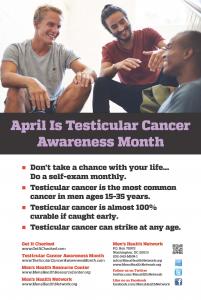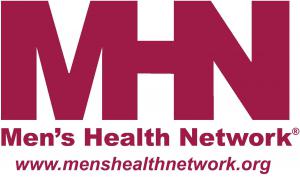Coalition Calls on the USPSTF to Review its Recommendation Against Testicular Self-Exams
April is Testicular Cancer Awareness Month, and a coalition of health organizations calls on the United States Preventative Services Task Force to take action.
WASHINGTON, DISTRICT OF COLUMBIA, UNITED STATES, April 5, 2022 /EINPresswire.com/ -- Several organizations are calling for the United States Preventative Services Task Force (USPSTF) to reconsider its recommendation against screening for testicular cancer, which includes a recommendation against self-exams. The coalition is also calling for increased research and greater awareness of the challenges facing testicular cancer patients, survivors, and their loved ones.The coalition, which includes the Men’s Health Caucus of the American Public Health Association (APHA), Men’s Health Network, The Male Wellness Collective, the Testicular Cancer Foundation, the Sean Kimerling Testicular Cancer Foundation, the Testicular Cancer Society, Save the Doodads, and the University of Central Florida’s Testicular Cancer Research Collaborative, continues to rally around improving the quality of life for testicular cancer patients and survivors while bringing awareness to their issues and calling on stronger tools to assess their health and wellbeing.
“This is an important time to raise awareness about testicular cancer," said Brandon Leonard, chair of the Men’s Health Caucus of the APHA. “Testicular cancer survival rates are very high with appropriate treatment, but early detection is essential to reducing both the physical and mental impact of testicular cancer for the thousands of men and boys who are diagnosed each year. A testicular self-exam is a simple tool that men and boys can use to check for anything unusual and discuss with their provider if there is a concern.”
In the U.S., males continue to be placed at unnecessary risk due to the USPSTF’s decision to recommend against testicular self-exams and against testicular cancer screening in a clinical setting. Compounding this problem is the failure of the Affordable Care Act to provide a Well Man Visit similar to the annual Well Woman Visit passed as part of the legislation.
"The USPSTF continues to give a "D" grading for screening testicular self-exams. That indicates that it should not be performed or recommended and screening has more a detrimental effect for a disease that is very curable,” said Dr. Ajay Nangia, Professor and Vice-Chair of Urology at the University of Kansas Medical Center. "However, there is a lack of evidence regarding any of this and the data that supports the "D" recommendation is extremely, extremely poor. We recommend and urge that the USPSTF do the right thing based on the lack of longitudinal or natural history of disease data and at least give screening testicular self-exams an indeterminate ‘I’ rating. In the absence of data, there does not mean that there is none"
Testicular cancer is the most common cancer among men aged between 15 and 35 years old and has the one of the highest survival rates – if found early. Those diagnosed at later stages have increased risks of anxiety, depression, heart disease, short and long-term memory loss, among other health concerns, than those who are diagnosed at earlier stages. This is in addition to issues of impotence, incontinence, or loss of libido, making awareness and early detection critically important. Yet, despite this, the USPSTF still recommends against screening for testicular cancer in adolescent or adult males.
“The USPSTF admits previously that there are no randomized, prospective trials on testicular self-examination,” said Michael Craycraft R.Ph., founder of the Testicular Cancer Society, “I agree with them on this point, adding that there never will be, which argues for an ‘I’ statement. However, new data does show that smaller sized palpable tumors have a lower risk of late-stage diagnosis and mortality. There are also newer algorithms of combining scrotal ultrasounds with tumor markers to reduce false positive ultrasound results.”
Craycraft added further that “new patient reported data indicates that testicular self-examination, knowledge and confidence is protective of later stage diagnosis, where the treatments alone are a substantial component of disease-related mortality.”
The USPSTF’s recommendation to not screen for testicular cancer goes against the available data, and the logic of preventative care. Early detection of cancer saves lives, and early treatment raises chances of survival and often lessens the severity of cancer treatment required.
“Early detection for testicular cancer is absolutely critical. Many years of life from too many men and boys have been lost because of this disease,” said Dr. Michael J. Rovito, Associate Professor of Health Sciences at the University of Central Florida and Founder of Male Wellness Collective, “It’s time males became more aware of the risks and began to take action to become familiar with their bodies.”
Rovito further suggested that “males should perform testicular self-examination monthly to monitor if anything abnormal develops. If something out of the ordinary is discovered, males should speak to their healthcare provider immediately.”
"Testicular cancer remains the most common malignancy among men 20 - 40 years old. Early detection is critical in its treatment and potential cure.” said Dr. Justin Loloi, urology resident at Montefiore Medical Center at the Albert Einstein College of Medicine. “Despite the USPSTF's recommendation against screening adolescent or adult males for testicular cancer via patient self-examination, further research and investigation may be warranted to determine whether self-examination plays a role in early detection and subsequent treatment. Nonetheless, we urge young men to seek urologic evaluation if there is concern for a testicular lump or lesion."
The TesticularCancerAwarenessMonth.com website helps educate people about risk factors, warning signs, and treatment options for the disease. The site offers a variety of resources to turn a difficult-to-discuss problem into an interactive and easier-to-approach learning experience, and is a great resource to help promote the importance of early screenings. The site also provides links to the websites of the organizations participating in the coalition.
About the Coalition:
Men’s Health Caucus of the American Public Health Association - https://www.menshealthcaucus.net/
Advocates for health needs of males their families including, but not limited to, health awareness and disease prevention, screening, early detection, treatment, advocacy and public health. The Caucus develops programs to address a wide range of male health topics, needs and emerging trends and issues. The Caucus also works closely with APHA and other Caucuses and various Sections to develop public health policy on behalf of males and their families everywhere.
Male Wellness Collective - https://malewellnesscollective.com/
Focuses on getting men on course with self-care. They aim for better health and well-being for all males, and in turn, their loved ones and communities, now and in future generations.
Men's Health Network (MHN) - https://www.menshealthnetwork.org/
Is an international non-profit organization whose mission is to reach men, boys, and their families where they live, work, play, and pray with health awareness messages and tools, screening programs, educational materials, advocacy opportunities, and patient navigation. Learn more about MHN at www.menshealthnetwork.org and follow them on Twitter @MensHlthNetwork and Facebook at www.facebook.com/menshealthnetwork. For more information on MHN's ongoing Dialogue on Men's Health series, visit www.dialogueonmenshealth.com
Sean Kimerling Testicular Cancer Foundation - https://www.seankimerling.org/
Our mission is to raise awareness of testicular cancer and the importance of early detection and treatment. We are a grassroots organization which engages young men with information and humor through social media, events and national distribution of our "Check'Em" self examination Shower Cards. www.seankimerling.org
Testicular Cancer Foundation - https://www.testicularcancerawarenessfoundation.org/
Provides education and support to young men to raise awareness about testicular cancer.
Testicular Cancer Society - https://testicularcancersociety.org/
Is dedicated to increasing awareness and education about the disease and providing support for fighters, survivors and caregivers.
Save the Doodads - https://savethedoodads.org/
is dedicated to fighting testicular cancer through health education and promotion, early detection methods, and advocacy. We want all men, especially young men to become more aware of their specific health needs and to become proactive about living a healthy life.
Testicular Cancer Research Collaborative: Headquartered at the University of Central Florida and is comprised of an international body of leading academics, clinicians, and policy experts who collaborate on producing high-impact works in the field.
###
John Elmendorf
Men's Health Network
+1 202-543-6461 ext. 101
email us here



